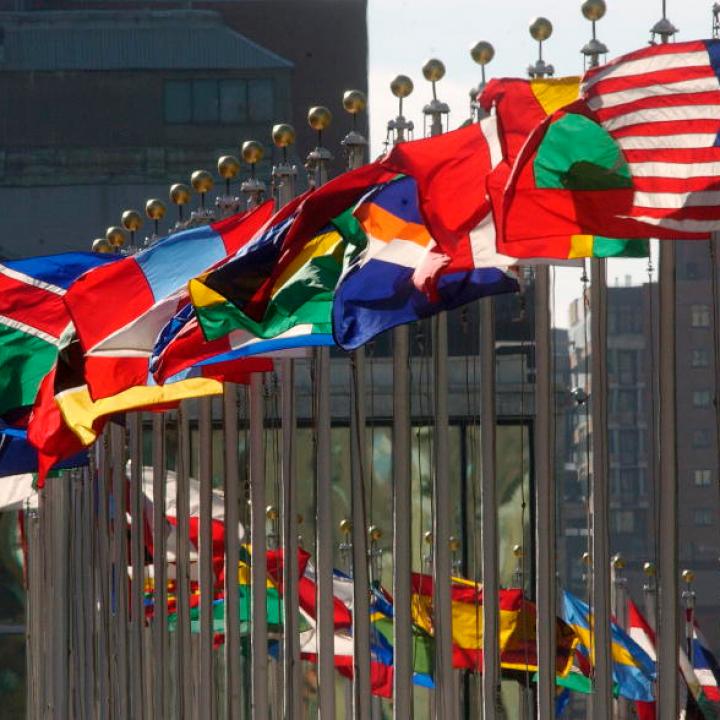
- Policy Analysis
- Articles & Op-Eds
Coronavirus Proves America First Is the Wrong Answer to Today’s Global Challenges

Leadership does not require serving in the unsustainable role of international policeman, but it does entail American engagement and a sense of responsibility to other countries.
COVID-19 does not respect the powerful, the wealthy or borders. It attacks every country and every individual. No one is immune or has immunity until they have been afflicted with it. On the one hand, we are reminded that humanity is the target and “we are all in this together.” On the other, individuals or nations can choose to hoard, protecting themselves first. Both realities exist today.
It will take time to emerge from this crisis, especially because we will likely face a second wave. All those countries in the Southern Hemisphere that have not yet suffered real outbreaks will experience them by the autumn, and, unfortunately, too many of these countries, especially in Africa, lack the medical, financial and technical means to deal with it.
Whatever the justification for a lack of preparedness for this first wave of the virus, there can be no excuse not to take advantage of the time to prepare for the second. If nothing else, by the fall, we must be in a position to have tests readily available both for the illness and the anti-bodies that signal immunity; to produce drug treatments based on the antibody sequence in the virus, which can be available long before a vaccine and would greatly reduce the severity of the illness; and to manufacture or acquire the protective gear to ensure that are no shortages around the country.
But even assuming we do everything right, there is a cost to us if our plans and actions are not replicated internationally. As Dr. Anthony Fauci has said, we cannot expect a return to normal life until there is a vaccine—and if steps are not taken to deal with the pandemic on a global scale, we will remain vulnerable until that point. Yes, we can mitigate the worst effects of the virus on our own, but our efforts will be far more effective if they are part of a coordinated international approach.
Here, we are reminded that an America First approach is not one that will make us safer or more likely to be able to return to normal life sooner. America First is a mindset that sounds good as a slogan but makes us more vulnerable. It elevates us to the exclusion of others. It erodes our soft power that draws others to us internationally and makes them more likely to follow our lead. It means others establish the standards—which might be okay if the transparency, credibility and purposes of others could be counted on.
Can the Chinese, who are trying to fill the vacuum of leadership left by us, fill that vacuum? They are certainly a producer of drugs, surgical masks, and ventilators and are delivering them internationally, but it was their deception and lack of transparency—reflecting the priority of always preserving secrecy on anything that might prove embarrassing to the regime—that has added to the scope and severity of the pandemic.
Authoritarian regimes will always put the health of the regime ahead of the health of publics, their own and others. That does not mean we shouldn’t be working with them now; we must. But it again tells us that U.S. leadership is essential to organize a collective response internationally, develop a coordinated approach to address the needs of the poorer countries that have not yet experienced extensive outbreaks, and shape a global plan medically and economically to limit the current effects of the virus and the consequences of the second wave.
COVID-19 has, regrettably, demonstrated that America First is not the answer to threats that ignore borders. Pandemics, climate change, terrorism, proliferation of weapons, including biological weapons, and economic recessions/depressions cannot be handled in isolation. They require cooperation. And, yes, they require cooperation with those with whom we have different interests and values. We can compete and disagree strongly with both the Chinese and the Russians on other issues, but they, too, share an interest in combatting these insidious threats that also endanger them. Cooperation with our allies whose interests and values converge with us comes more naturally, provided we make the effort to work with them and treat them as allies and not competitors whether on vaccine development or medical supplies.
Having worked in the two Republican White Houses and a Democratic one, and been a close aide to Secretaries of State James Baker, Madeleine Albright and Hillary Clinton, I know what those administrations would have been doing internationally. There would have been daily calls with the leaders and the ministers, starting with our allies. They would have created working groups with our allies and others to address the need to establish best practices, address shortfalls of medical equipment and materials, collaborate on treatment and vaccine developments, cooperate on monetary policy, fashion an assistance package for poorer states, and deal with how to mitigate the second wave.
These Republican and Democratic administrations differed on many things but they shared the same presumption: the world is a safer place when the U.S. leads and does not set itself apart. When we get beyond the COVID-19 crisis, we need again to discuss what America’s role in the world should be. Leadership does not require being the world’s policeman—a role that is neither desirable nor sustainable—but it does require American engagement and a sense of responsibility not only to ourselves.
Dennis Ross is the counselor and William Davidson Distinguished Fellow at The Washington Institute. This article was originally published on the New York Daily News website.
New York Daily News



